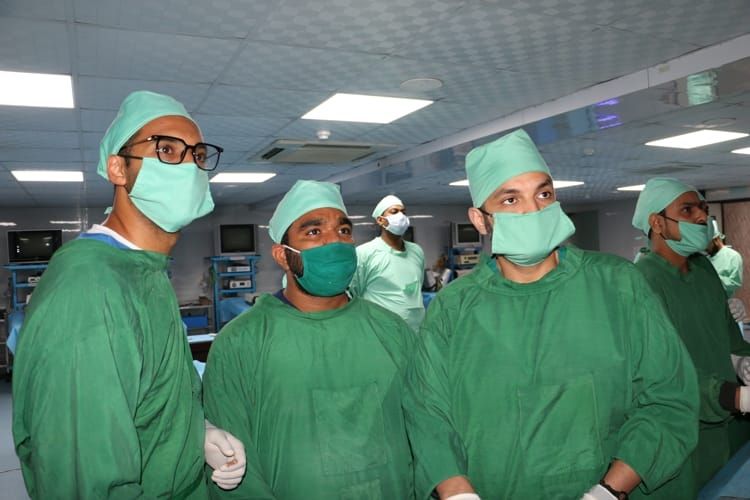Event Date: Mon - 19 Jun, 2023
Event Time: 9:25 am
Location: World Laparoscopy Hospital
Institute: WLH
Laparoscopic fundoplication is a minimally invasive surgical technique used to treat gastroesophageal reflux disease (GERD). During this procedure, the surgeon wraps the upper part of the stomach, known as the fundus, around the lower esophagus to reinforce the lower esophageal sphincter, preventing the backward flow of stomach acid and alleviating symptoms of GERD.
Nephrectomy is the surgical removal of a kidney. Laparoscopic nephrectomy allows for a less invasive approach compared to traditional open surgery. Surgeons make small incisions and use specialized instruments to detach and remove the kidney, often used for conditions such as kidney cancer, severe kidney infections, or kidney donation.
Splenectomy involves the removal of the spleen, an organ located in the upper left part of the abdomen. Laparoscopic splenectomy offers a minimally invasive alternative to open surgery for various conditions, including spleen enlargement, certain blood disorders, and traumatic injuries to the spleen.
Heller's myotomy is a surgical procedure performed to treat achalasia, a condition characterized by the inability of the lower esophageal sphincter to relax, causing difficulty in swallowing. During the laparoscopic Heller's myotomy, the surgeon cuts the muscles of the lower esophageal sphincter to allow easier passage of food into the stomach.
Thoracic surgeries performed during live tissue dissection involve various procedures related to the chest and lungs, such as lung biopsy, lobectomy, or lung volume reduction surgery. Laparoscopic thoracic surgeries utilize small incisions and specialized instruments to access the thoracic cavity, offering patients less postoperative pain, shorter hospital stays, and faster recovery compared to traditional open surgeries.
Performing these advanced laparoscopic procedures on live tissue during the demonstration provides surgeons with a realistic and dynamic learning experience. It allows them to refine their surgical skills, understand the intricacies of each procedure, and enhance their ability to provide optimal care for patients requiring these interventions.
World Laparoscopy Hospital: A Hub of Contemporary Learning with Daily 8-Hour Hands-On Laparoscopic Training
In the realm of medical education and training, there are institutions that stand out as pioneers, constantly pushing the boundaries of what is possible. One such institution is the World Laparoscopy Hospital, where a contemporary event unfolds every day, featuring a remarkable 8-hour hands-on laparoscopic training program.
A Daily Revolution in Learning
At the heart of the World Laparoscopy Hospital's mission is the commitment to train the next generation of surgeons and medical professionals in the art and science of Minimal Access Surgery. What makes this institution truly exceptional is its daily 8-hour hands-on laparoscopic training program.
The Laparoscopic Revolution
Laparoscopic surgery, often referred to as minimally invasive surgery, has revolutionized the field of surgery in recent decades. Instead of large incisions, this technique involves making tiny keyhole-like openings through which a camera and surgical instruments are inserted. This results in significantly reduced patient trauma, shorter recovery times, and less post-operative pain.
The Daily Experience at World Laparoscopy Hospital
Every day at World Laparoscopy Hospital is a contemporary event in the world of medical education. Here's a glimpse into what a typical day looks like for those fortunate enough to train at this prestigious institution:
1. Intensive Training: The 8-hour hands-on laparoscopic training is an immersive experience where trainees work side by side with experienced surgeons. This hands-on approach ensures that students gain practical skills and confidence in performing laparoscopic procedures.
2. State-of-the-Art Facilities: The hospital boasts state-of-the-art facilities, equipped with the latest laparoscopic instruments and technology. Trainees have access to the same tools and equipment used in modern surgical practices around the world.
3. Expert Faculty: The training is conducted under the guidance of expert faculty members who are pioneers in the field of Minimal Access Surgery. Their wealth of knowledge and experience provides students with invaluable insights and mentorship.
4. Customized Curriculum: The training program is tailored to the specific needs and experience levels of each student. Whether you are a novice or an experienced surgeon looking to refine your skills, there is a program to suit your requirements.
5. Global Reach: World Laparoscopy Hospital attracts medical professionals from all corners of the world. This diverse group of trainees fosters cross-cultural exchanges and collaborations, enriching the learning experience.
6. Research Opportunities: Beyond the hands-on training, the hospital also serves as a hub for research and innovation in the field of Minimal Access Surgery. Trainees have the opportunity to participate in cutting-edge research projects.
Impact Beyond the Classroom
The impact of the daily 8-hour hands-on laparoscopic training at World Laparoscopy Hospital extends far beyond the classroom. Graduates of this program return to their respective countries armed with advanced skills, contributing to the global dissemination of minimally invasive surgical techniques. Patients around the world benefit from the reduced invasiveness, faster recoveries, and improved outcomes that these skilled professionals bring to their practice.
In conclusion, World Laparoscopy Hospital's commitment to daily 8-hour hands-on laparoscopic training is a testament to its dedication to excellence in medical education. By offering a world-class learning environment and fostering a culture of innovation, this institution is shaping the future of surgery, one trainee at a time. It is not just an institution; it is a beacon of hope for patients and a driving force in advancing the field of surgery.


